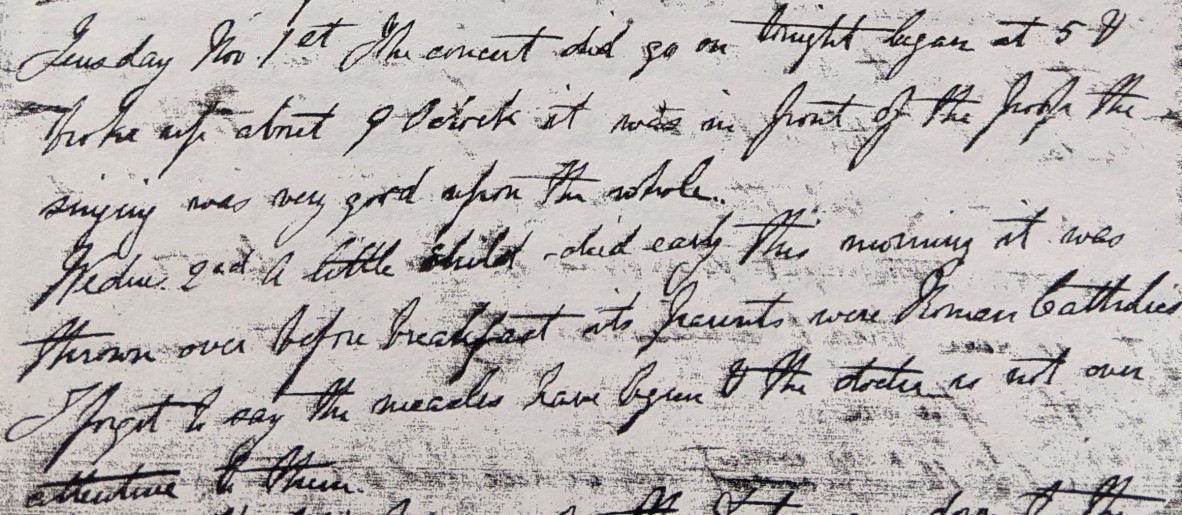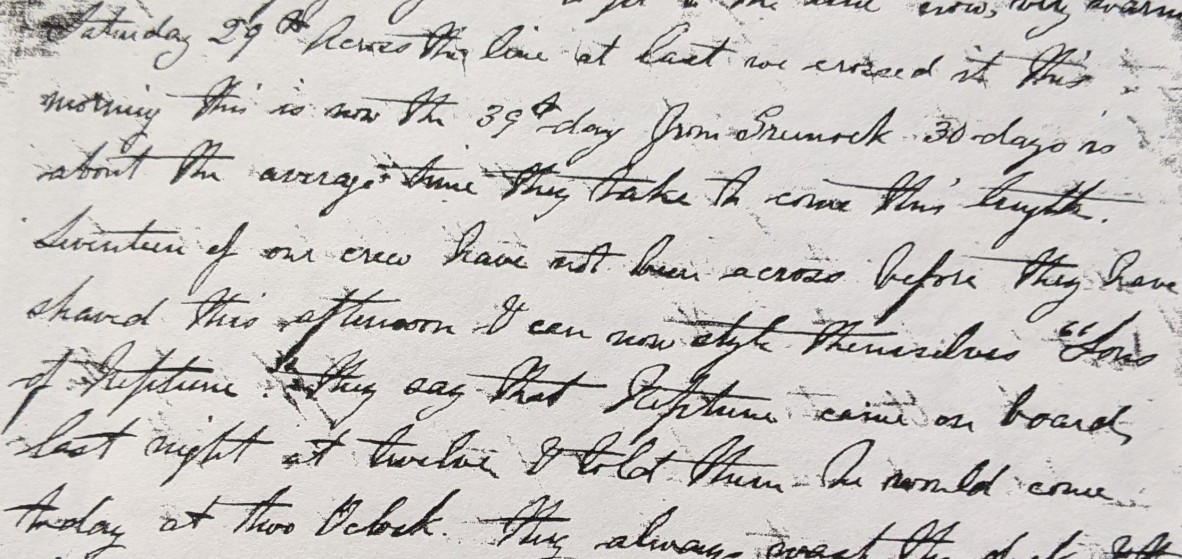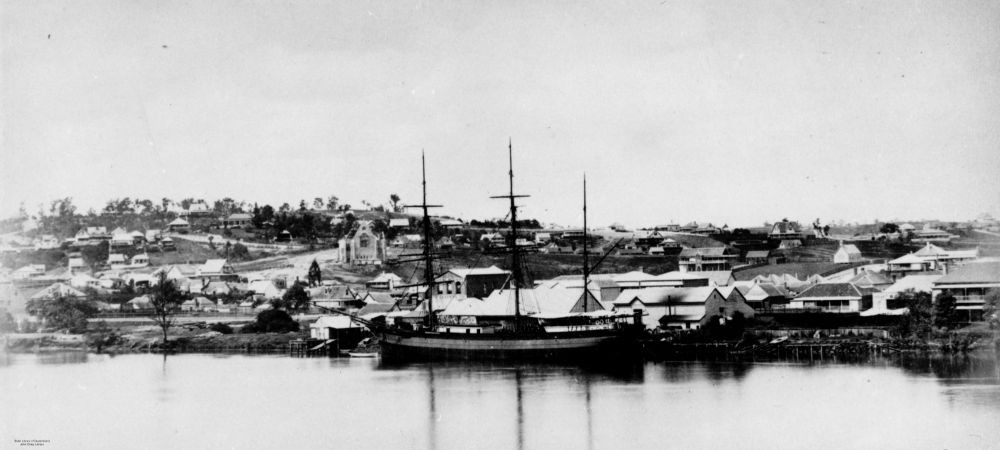Agnes Learmonth and the ‘Sons of Neptune’
By Dr Allison O'Sullivan - 2020 John Oxley Library Honorary Fellow | 2 July 2021
Guest blogger: Dr Allison O'Sullivan - 2020 John Oxley Library Honorary Fellow.
If you're interested in the hearing more stories from the diaries of Women living in colonial Queensland don't miss Dr Allison O'Sullivan's Research Reveals talk on the 9th February 2022, 6pm, Auditorium 1. BOOK HERE for onsite tickets. This event will also be livestreamed on State Library's Facebook and Live Stream webpage.
Agnes Learmonth was about eighteen years old when she boarded the Elizabeth Ann Bright from the Black Ball Line in Greenock, Scotland, along with her parents and extended family, including an Aunt, brother Robert, sister Maggie and at least one other sibling and their spouse.
Agnes’ diary is filled with the usual observations of a young woman on a long sea voyage: the organisation of berths and meals, religious services, births and deaths, and the on-board entertainment such as the evening concerts performed by passengers, as well as the news to be gleaned from passing ships.

Transcription: Tuesday 1st November: the concert did go on tonight and broke up about 9 o’clock. It was in front of the people. The singing was very good upon the whole.
Wed 2nd: A little child died early this morning it was thrown over before breakfast its parents were Roman Catholics. I forgot to say that measles have begun and the doctor is not over attentive to them.
Extract from diary: OM83-17, Agnes Learmonth Diary, John Oxley Library, State Library of Queensland.
On Saturday 24th October Agnes made note that the ship had crossed the equator, 29 days out of Greenock, which was about the average sailing time. Agnes and other passengers were invited to witness the almost sacred line-crossing ceremony conducted by the sailors on board, and she described in great detail what she saw.
It is a long-standing tradition that sailors mark the crossing of the equator with a ceremony in which ‘Neptune’ comes aboard, demanding tribute from those who have never crossed the line (i.e. the equator) before. These novice sailors then graduate from being mere *‘pollywogs’ (tadpoles) to ‘Sons of Neptune.’ As Agnes relates in her diary:

Transcription: Saturday 29th November: here’s the line at last we crossed it this morning this is now the 39th day from Greenock 30 days so about the average time they take to come this length? Seventeen of our crew have not been across before. They have now shaved this afternoon and can now style themselves “Sons of Neptune.” They say that Neptune came on board last night and told them he would come today at two o’clock.
Extract from diary: OM83-17, Agnes Learmonth Diary, John Oxley Library, State Library of Queensland
The preparations on deck were elaborate: the two cannons on board were relieved of their wheeled bases which were lashed together to form Neptune’s carriage. Two sailors donned sacks “tied so that they could creep on their hands and feet.” With sheepskin tied on for ears and tails they were Neptune’s horses. At two o’clock Neptune and his Queen (both seasoned sailors in costume) boarded their carriage and were solemnly drawn around the deck, accompanied by a guard of honour consisting of the ship’s doctor, barber, clerk, and several others. Shaking hands with the Captain on the poop deck, Neptune then proceeded to ‘baptise’ his seventeen novitiates in a tub of seawater. As they stumbled rubbing their salty eyes down onto the main deck the ‘horses’ provided some quality slapstick entertainment for the crowd, tripping them as they walked.
The rest of their voyage was largely uneventful, although an outbreak of measles had many fearing they would be quarantined, but the ship docked in Brisbane in January 1865. Sadly, after their arrival Agnes’ sister Maggie would die in 1867, and her father Robert in 1869, but many of the family continued to thrive in Queensland, living out their days in the West End and Cleveland, among other places.
*The word pollywog comes from the Middle English words for head and wiggle and bears no relationship to other far more unpleasant words it may appear to be related to. I remember my grandfather using it decades ago but haven’t heard it in many years.
Dr Allison O'Sullivan

Ship docked at the wharves, South Brisbane ca. 1881. Negative number 61754, John Oxley Library, State Library of Queensland.
Related collection items from the John Oxley Library
- OM83-17 Agnes Learmonth Diary; John Oxley Library, State Library of Queensland. Photocopy of a handwritten diary by Agnes Learmonth who sailed from England to Australia in 1864 on the ship Elizabeth Anne Bright.
Other blogs by Dr Allison O'Sullivan:
- Getting to know you: Discovering colonial women's diaries in the John Oxley Library
- Drama on the high seas: the shipboard diary of Margaret Gray, 1883
If you're interested in learning more about the 'Crossing the Line ceremony', you can read the blog A Navy Nasho: Alex Garlin Digital Story and Oral History where sailor Alex Garlin talks about the ceremony during his time on board an Australian Navy ship during the Second World War.
Comments
Your email address will not be published.
We welcome relevant, respectful comments.